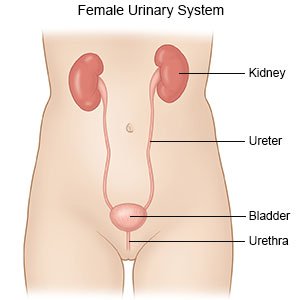Urinary tract infections, or UTIs, cause discomfort and frustration for many people, especially women. If you’ve endured the pain of a UTI, you understand the urgency of prevention. While antibiotics offer relief post-infection, the true defense lies in preventing UTIs in the first place.
UTIs often target women and those assigned female at birth. Around 20% of women will experience a UTI in their lifetime.
What is Urinary Tract Infection (UTI)?
A Urinary Tract Infection (UTI) is a prevalent microbial infection affecting various components of the urinary system. The urinary system encompasses the urethra, bladder, and kidneys, and UTIs can manifest in any of these anatomical segments.

UTIs commonly originate from bacterial infiltration of the urinary tract.
Escherichia coli (E. coli), Klebsiella, Proteus, and Enterococcus are the most common bacteria that can cause a UTI.
These bacteria typically ascend into the urinary tract urethra and can eventually move into the urinary bladder. When the bladder isn’t completely voided and bacteria continue to overgrow the infection can eventually climb further up and into the kidneys, resulting in a kidney infection (pyelonephritis).
Here are 12 ways you can help to prevent UTIs
1. Drink Plenty of Water
Staying well-hydrated is a cornerstone of urinary tract health. Women who consume less than 1.5 liters of water daily have a 50% increased risk of developing UTIs. If you are prone to getting UTIs then you should be hydrating regularly. Adequate hydration encourages frequent urination which helps to flush out bacteria from your urinary tract. Aim for about eight glasses of water every day.
If plain water isn’t your preference, consider decaffeinated herbal tea or milk. Avoid hydrating with excessively sweetened beverages as this may contribute to elevated blood glucose levels.
Reducing alcohol and caffeine intake can also contribute to a healthier urinary system.
2. Urinate Before and After Intercourse
Sexual activity – especially in women – can introduce bacteria into the urethra. To mitigate this risk, habitually urinate before and after intimacy. This practice helps eliminate potential bacteria that could lead to a UTI.
Additionally, gently cleaning your genital area before intercourse can contribute to maintaining cleanliness and minimizing the transfer of bacteria to the urethra.
3. Stay Hydrated After Intercourse
After intercourse, try to drink a glass of water to help flush out any bacteria that might have entered your urethra during sexual activity.
4. Wipe Front to Back
After using the bathroom, make it a habit to wipe your genital area from front to back. This simple action is crucial because the rectum is a common source of E. coli bacteria. By wiping in this direction, you minimize the risk of transferring these bacteria from the anus to the urethra which can prevent UTIs.
If you are dealing with diarrhea, adhering to the front-to-back wiping method becomes even more critical.
Diarrhea can disrupt normal bowel movements and increase the potential for E. coli to spread from the rectum to the urethra.
5. Take Cranberry Extract
Cranberry extract can be an effective preventive measure against UTIs. Regular consumption of cranberry products containing proanthocyanidins (PACs) can hinder the attachment of bacteria to the bladder wall, reducing the risk of infection. Opt for cranberry supplements over cranberry juice, as supplements provide a higher concentration of PACs.
6. Avoid Scented Vaginal Washes and Bubble Baths
Preserving the inherent bacterial equilibrium within the vaginal region plays a pivotal role in UTI prevention. Scented feminine products have the potential to upset this delicate balance, providing an environment for detrimental bacteria to thrive. It’s advised to avoid the use of scented douches, pads, tampons, and powders. Additionally, scented bath oils, soaps, and bubble baths can lead to genital irritation and disrupt the harmonious bacterial equilibrium of the vaginal area.
7. Avoid Holding Your Urine
Delaying trips to the restroom can create a breeding ground for bacterial growth. If you are prone to getting UTIs aim to urinate every 3 to 4 hours and fully empty your bladder each time. This practice becomes even more crucial during pregnancy, as pregnancy increases the risk of UTIs.
8. Use Probiotics
Probiotics are vital in maintaining a healthy balance of bacteria in your body, including your urinary tract. They promote a strong immune system and support the growth of beneficial bacteria in both the vagina and urinary tract.
Including probiotic-rich foods like yogurt, sauerkraut, and kefir can help prevent the propagation of harmful bacteria that can lead to UTIs.
9. Opt for Loose Clothing
Choose clothing that promotes airflow and minimizes moisture accumulation in your genital area. This can help inhibit bacterial growth that thrives in warm, damp environments.
10. Evaluate Birth Control Methods
Some birth control methods can contribute to bacterial overgrowth and UTIs. Diaphragms, non-lubricated condoms, spermicides, and spermicide condoms are potential culprits. If you suspect your birth control is linked to UTIs, consult with your doctor to explore alternative options for birth control
11. Prioritize Proper Hygiene
Practicing good hygiene habits is essential for preventing UTIs. As discussed, wiping from front to back after using the restroom helps prevent the transfer of bacteria from the rectum to the urethra. However, showering daily and especially after activity that causes sweating is even more crucial if you are prone to UTIs.
12. Consider Antibiotics When Necessary
If you experience recurrent UTIs unresponsive to preventive treatment, your healthcare provider might recommend a low daily dose of oral antibiotics. This preventive approach can help manage harmful bacteria and reduce the likelihood of UTIs.
However, long-term antibiotic use should be closely monitored by your medical provider.
While common, UTIs are an unwanted nuisance and can lead to serious infection if left untreated.
Adopting these simple yet effective practices proactively can help reduce the risk of introducing detrimental bacteria into your urinary tract and keep you pain-free.
Dr. Sergio Guiteau is a physician who is board certified in Family Practice and Sports Medicine with added certifications in Aesthetic Medicine. He specializes in Preventive Medicine, Sports Medicine, and Anti-Aging Medicine and blogs on Advancedrejuv.com/blog

